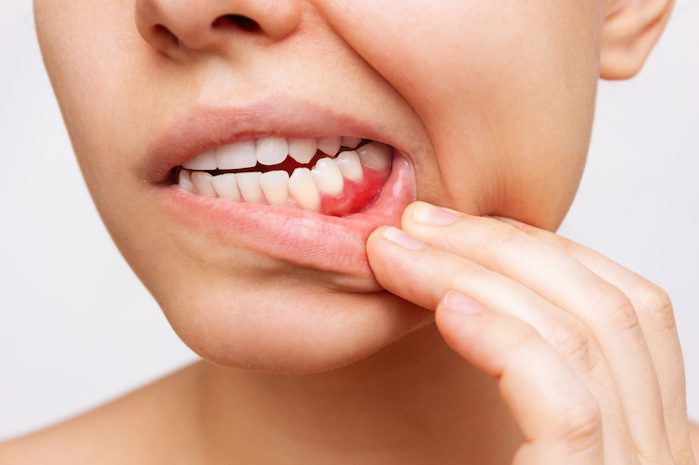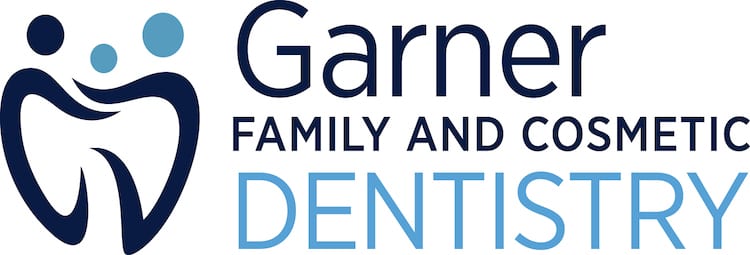If your gums bleed while you’re brushing your teeth, you should consider this as an early warning sign of periodontal disease. Periodontal disease, or gum disease, is a bacterial infection that can cause tooth damage and loss if not appropriately treated.
Garner dentist Dr. Matthew Jenne offers treatment for the signs and symptoms of gum disease in our Garner dentist office to restore your oral health.
Treatment Options
Bleeding gums signify that there is plaque building up around your gum line. This often leads to gingivitis or gum inflammation. Gingivitis can quickly develops into periodontitis or the inflammation of your tooth’s supporting bones.
Dr. Jenne screens all of our patients at Garner Family and Cosmetic Dentistry for gum disease during routine dental cleanings. However, if you notice your gums are bleeding, you should schedule a consultation with our team on how to improve your overall gum health.
Our main goal during treatment is to remove all of the build-up that is irritating your gums. After that, we will also help you develop a personalized oral hygiene plan to avoid similar issues in the future as well as the severe consequences of untreated gum disease.
Gum Disease Stages
Gum disease, also called periodontal disease, is a common condition that affects the tissues around your teeth. It starts slowly, but ignoring it can lead to serious problems like tooth loss.
Stage 1: Gingivitis
The first stage of gum disease is called gingivitis. This stage is mild and often easy to treat. Gingivitis happens when plaque builds up on your teeth and irritates your gums. Plaque is a sticky film made of bacteria. If you don’t brush and floss regularly, plaque can grow quickly.
Signs of gingivitis include red, swollen gums that bleed when you brush or floss. Your breath might also smell bad. The good news is that gingivitis does not yet damage the bone or tissue holding your teeth in place. Gingivitis can be reversed with good oral hygiene and a professional dental cleaning.
Stage 2: Early Periodontitis
If gingivitis is not treated, it can turn into early periodontitis. At this stage, the plaque hardens into tartar, which can’t be removed by brushing alone. Tartar causes more irritation and leads to infection under the gumline. Your gums may start pulling away from your teeth, forming small pockets. These pockets trap even more bacteria.
In early periodontitis, your gums may bleed more often, and you might notice they are more tender. Some bone loss may also start to occur. While this stage is still treatable, it requires more than brushing and flossing. We may need to perform a deep cleaning called scaling and root planing to remove the tartar and clean the infected areas.
Stage 3: Moderate Periodontitis
In moderate periodontitis, the damage becomes more serious. The infection spreads deeper, and the pockets around your teeth become larger. More gum tissue and bone are lost, weakening your teeth’s support.
At this point, you may notice your teeth feeling loose. Your gums may recede, making your teeth look longer than before. You could also have persistent bad breath and a bad taste in your mouth. Treatment may include more deep cleanings and possibly medications to control the infection.
Stage 4: Advanced Periodontitis
The final stage is advanced periodontitis. The infection has now caused major damage to the bone and tissues. Teeth may shift, become very loose, or even fall out. Chewing can be painful, and your bite may feel different.
This stage often requires surgery to clean the deep pockets and repair the damage. Sometimes, teeth may need to be removed and replaced with implants or dentures.

How Gum Disease Impacts Your Body
Gum disease doesn’t just harm your teeth and gums—it can also hurt the rest of your body. Many people think gum disease only causes problems in the mouth, like bleeding gums or loose teeth. But the truth is, this disease can lead to serious health issues in other parts of your body if left untreated.
Heart Disease
One of the biggest risks linked to gum disease is heart disease. The bacteria from your gums can enter your bloodstream and cause inflammation in your blood vessels. This can lead to a buildup of plaque in your arteries, which makes it harder for blood to flow. Over time, this may increase your chances of a heart attack or stroke. People with gum disease are more likely to have heart problems than healthy gums.
Diabetes
Gum disease and diabetes are closely connected. People with diabetes have a harder time fighting off infections, which means gum disease can get worse more quickly. At the same time, gum disease can make it harder to control blood sugar levels. This creates a harmful cycle where each condition makes the other one worse. Taking care of your gums can help keep your blood sugar under control.
Lung Problems
Bacteria from your mouth can also affect your lungs. If you breathe in the bacteria from infected gums, it can cause or worsen respiratory problems like pneumonia or bronchitis. This is especially dangerous for older adults and people with existing lung conditions.
Pregnancy Complications
Gum disease can even affect unborn babies. Pregnant women with gum disease may be more likely to deliver early or have babies with low birth weight. Inflammation from the infection may trigger early labor. Pregnant women need to see a dentist and keep their gums healthy during pregnancy.
Other Health Issues
Gum disease has also been linked to other serious health conditions, such as kidney disease, rheumatoid arthritis, and even some forms of cancer. While more research is still being done, the connection between oral and full-body health is clear.
Bleeding Gums FAQs
Bleeding gums can indicate a serious oral health condition. Read the answers to these commonly asked questions and learn more.
When should I be concerned about bleeding gums?
Bleeding gums may occur for a variety of reasons, making it difficult to differentiate between them being a health concern or a normal reaction. The best way to gauge whether you should be concerned about bleeding gums is if they occur continuously. This may be a sign of periodontal disease, which can be treated and diminished if caught early.
Can stress cause gum bleeding?
Stress may cause gums to bleed. Stress can weaken patients’ immune system and may cause inflammation. Inflamed gums are more likely to bleed upon contact. Stress does not directly cause a patient’s gums to bleed, however, it puts a patient at a higher risk to experience bleeding gums.
Can salt water rinse heal gum infections?
Rinsing with salt water can heal gum infections. Salt draws out inflammation and infection from the gums. Warm water soothes gums and helps heal them. Rinsing with salt water is a good way to reduce gum inflammation and help heal the infection.
How long do bleeding gums take to heal?
With proper oral care, bleeding gums may stop after 3-10 days. It is important to practice a good, regimented oral care routine to heal bleeding gums.
Is Vitamin C good for gums?
Vitamin C can promote gum and oral health. It helps keep gum tissue strong and healthy and reduces the risk of bleeding gums.
Can bleeding gums cause iron deficiency?
An iron deficiency can put patients at a higher risk to experience bleeding gums. Iron deficiency can lead to weakened gum tissue which makes them more prone to bleed upon contact.
What is the fastest way to heal bleeding gums?
The best way to heal bleeding gums is to increase your oral care routine. Rinsing with saltwater also helps to reduce inflammation and wash out trapped bacteria.
Why do gums bleed at night?
Grinding your teeth at night puts a lot of pressure on your teeth, gums, and jaw. As you grind your gums may become inflamed and bleed as a result of the pressure you exert on them. The pressure your teeth undergo during the day may cause your gums to bleed at night.
Schedule A Dental Exam Today
If you have concerns about the health of your gums, we welcome you to schedule a visit with us in Garner. We can conduct a periodontal exam to determine if you have gum disease and recommend appropriate solutions. Our office welcomes new patients, and Dr. Jenne offers personalized dentistry for your needs.
